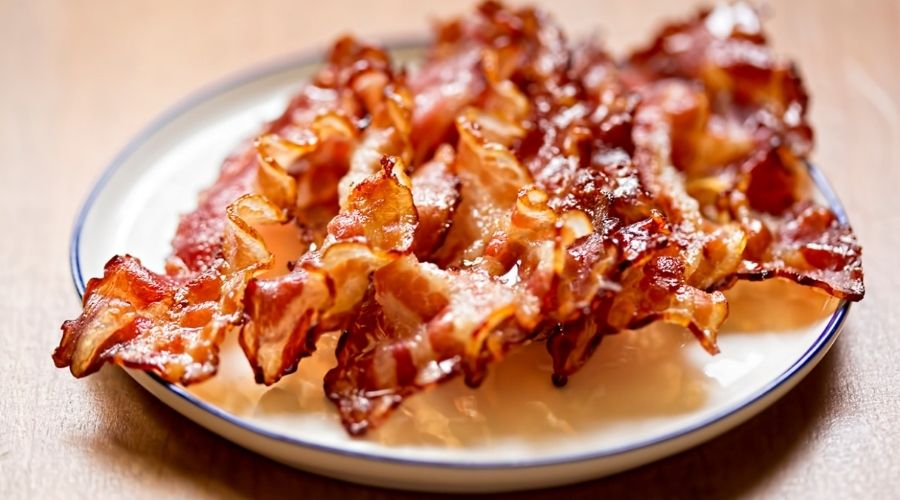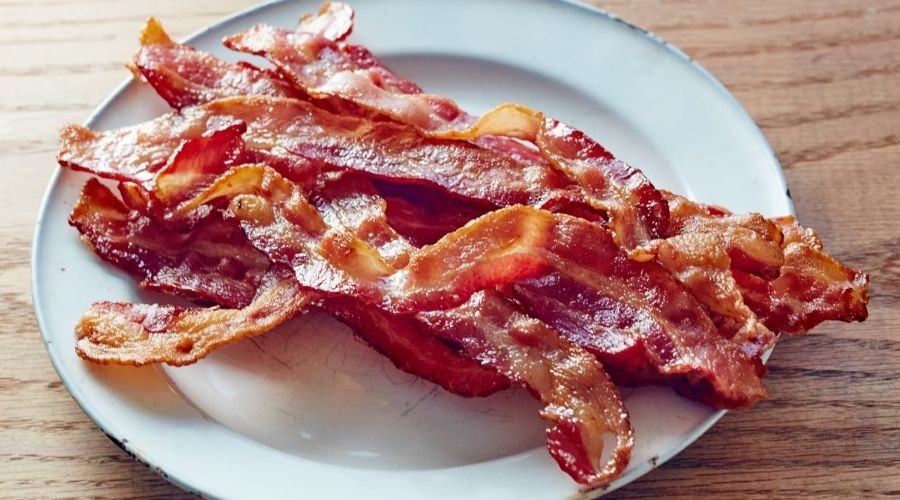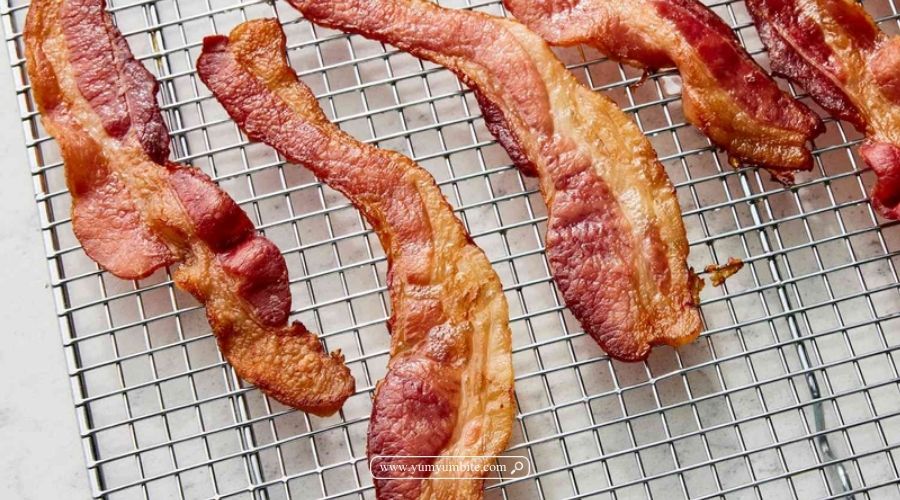Cooked bacon is a delicious addition to many dishes, from breakfast plates to gourmet burgers.
However, knowing how to store it properly can significantly affect its flavor and texture.
Improper storage can lead to soggy or stale bacon, which detracts from its savory goodness.
In this article, we’ll explore the best methods for storing cooked bacon to ensure it remains fresh and crispy.
Whether you have leftovers from a hearty breakfast or a batch made for meal prep, these tips will help you enjoy your cooked bacon at its best.
Why Storing Cooked Bacon Properly Matters
Storing cooked bacon properly is essential for maintaining its crispy texture and rich flavor.
Bacon is a beloved ingredient that adds depth to a variety of dishes, from breakfast staples to gourmet salads.
However, if not stored correctly, cooked bacon can quickly become soggy or develop an unappetizing taste, diminishing its appeal.
Proper storage techniques help preserve the quality of the bacon, preventing it from absorbing unwanted odors and flavors from the refrigerator.
Additionally, understanding how to store bacon safely minimizes food waste, allowing you to enjoy this delicious treat for longer.
By taking the time to store cooked bacon properly, you ensure that each bite retains its savory goodness, enhancing your meals and snacks with the perfect crunch.
Complete Guide on How to Store Cooked Bacon

Storing cooked bacon properly is key to preserving its flavor and texture, ensuring you can enjoy it later without losing quality.
Here’s a comprehensive guide on how to do it effectively.
1. Cool the Bacon
After cooking, allow the bacon to cool at room temperature for about 10-15 minutes.
This step is crucial as it prevents condensation from forming in the storage container, which can lead to sogginess.
2. Choose the Right Storage Method
There are a few options for storing cooked bacon. For short-term storage, consider using an airtight container or a resealable plastic bag.
If you plan to keep the bacon for a longer period, freezing is the best option.
3. Layering with Paper Towels
If you’re using a container, place a layer of paper towels at the bottom to absorb excess moisture.
After adding the bacon, you can place another layer of paper towels on top to help maintain its crispiness. This method is especially useful if you’re stacking bacon slices.
4. Refrigeration for Short-Term Use
Store the cooked bacon in the refrigerator if you plan to use it within a few days. Properly stored, it can last about 4 to 5 days.
Ensure that the container or bag is sealed tightly to prevent air exposure.
5. Freezing for Long-Term Storage
For longer storage, freezing cooked bacon is highly effective. Arrange the cooled bacon slices in a single layer on a baking sheet and freeze until solid.
Once frozen, transfer the slices to an airtight freezer-safe bag or container.
This method prevents the bacon from sticking together, allowing you to take out only what you need.
6. Thawing and Reheating
When you’re ready to enjoy your stored bacon, if frozen, thaw it in the refrigerator overnight.
For reheating, you can microwave the slices for a few seconds or warm them in a skillet to restore their crispy texture.
7. Check for Freshness
Before consuming stored bacon, check for any signs of spoilage, such as off smells or unusual textures.
If anything seems amiss, it’s better to err on the side of caution and discard it.
By following these guidelines, you can ensure that your cooked bacon stays delicious and ready to enhance your meals.
Proper storage not only preserves quality but also allows you to enjoy the convenience of having pre-cooked bacon on hand whenever you need it.
What to Look for While Storing Cooked Bacon
When storing cooked bacon, several key factors are essential to ensure its freshness and quality.
First, allow the bacon to cool completely before placing it in a storage container.
This helps prevent condensation, which can make the bacon soggy.
Next, choose an airtight container or a resealable plastic bag to minimize air exposure, which can lead to spoilage and loss of flavor.
If you’re using a container, consider layering paper towels between the bacon slices to absorb excess moisture and maintain crispness.
Additionally, be mindful of the storage duration. Cooked bacon is best consumed within 4 to 5 days when refrigerated, so keeping track of how long it has been stored is important.
For longer storage, freezing is ideal, allowing you to enjoy your bacon for several months without sacrificing quality.
Lastly, always inspect the stored bacon for signs of spoilage, such as off odors or unusual textures, before consuming.
By paying attention to these factors, you can effectively store cooked bacon and enjoy its deliciousness whenever you desire.
How to Choose the Right Accessories for Storing Cooked Bacon

Selecting the right accessories for storing cooked bacon is essential for preserving its flavor and texture.
Here are some considerations to help you make the best choices:
1. Airtight Containers
Opt for high-quality airtight containers made of glass or BPA-free plastic.
These containers effectively seal out air and moisture, preventing the bacon from becoming stale or soggy.
Choose a size that suits the amount of bacon you have to avoid excess air in the container.
2. Resealable Plastic Bags
If you prefer a more flexible option, resealable plastic bags are great for storing cooked bacon. Look for heavy-duty bags that are designed for food storage.
Ensure you remove as much air as possible before sealing to help maintain freshness.
3. Paper Towels
Keep a roll of paper towels handy when storing cooked bacon.
Placing layers of paper towels between the bacon slices can absorb moisture, helping to maintain crispness and preventing the slices from sticking together.
4. Labels and Markers
Using labels and a permanent marker can be beneficial for tracking storage dates.
Clearly marking the date on your container or bag helps ensure you consume the bacon while it’s still fresh, reducing the risk of spoilage.
5. Freezer-Safe Accessories
If you plan to freeze your cooked bacon, invest in freezer-safe containers or bags.
These accessories are designed to withstand low temperatures and help prevent freezer burn, allowing you to enjoy your bacon later without losing quality.
By choosing the right accessories for storing cooked bacon, you can effectively preserve its deliciousness, making it easy to enjoy this savory treat whenever you desire.
Proper storage not only enhances the quality of your bacon but also adds convenience to your meal preparations.
How to Tell If Cooked Bacon Is Bad After Storing
Determining whether cooked bacon has gone bad is crucial for ensuring food safety and enjoying your meals to the fullest.
Here are key signs to look for:
1. Smell
One of the first indicators of spoilage is the smell. Fresh cooked bacon should have a savory, smoky aroma.
If you notice a sour or off-putting odor, it’s a strong indication that the bacon has spoiled, and you should discard it.
2. Texture
Examine the texture of the cooked bacon. It should be crispy and firm. If the bacon feels excessively greasy, slimy, or mushy, it’s a sign of spoilage.
Such textures indicate that the bacon has likely deteriorated and is no longer safe to eat.
3. Appearance
Check for any visible signs of mold or discoloration. Fresh cooked bacon should have a consistent color and a slight sheen.
If you see any dark spots, unusual colors, or mold growth, it’s best to throw the bacon away immediately.
4. Taste
If the bacon looks and smells fine but you’re still uncertain, consider tasting a small piece. If it tastes off, sour, or stale, it’s safest to discard it rather than risk consuming spoiled food.
5. Storage Duration
Keep track of how long the cooked bacon has been stored. When refrigerated, it’s best consumed within 4 to 5 days.
If it has been stored longer than this timeframe, even if it appears and smells fine, it’s safer to err on the side of caution and dispose of it.
By being vigilant and checking for these signs, you can ensure that your stored cooked bacon remains safe and enjoyable to eat.
When in doubt, it’s always better to prioritize safety and avoid potential foodborne illnesses.
1. How long can I store cooked bacon in the refrigerator?
Cooked bacon can be stored in the refrigerator for up to 4 to 5 days. Make sure it’s kept in an airtight container or a resealable plastic bag to maintain its freshness.
2. Can I freeze cooked bacon?
Yes, you can freeze cooked bacon. Place it in a single layer on a baking sheet to freeze individually, then transfer to an airtight freezer-safe bag or container.
Frozen cooked bacon can last up to 3 months.
3. What’s the best way to reheat stored cooked bacon?
To reheat stored bacon, you can microwave it for a few seconds or warm it in a skillet over medium heat. This helps restore its crispy texture.
4. Should I let cooked bacon cool before storing it?
Yes, it’s important to let cooked bacon cool at room temperature for about 10-15 minutes before storing it.
This prevents condensation in the container, which can make the bacon soggy.
5. How do I keep cooked bacon crispy when storing?
To keep cooked bacon crispy, layer it between paper towels in your storage container.
The paper towels will absorb excess moisture and help maintain its crunchiness.
6. Can I store cooked bacon with other foods?
It’s best to store cooked bacon separately from other foods to prevent it from absorbing odors and flavors.
This ensures that it retains its distinct taste.
7. How can I tell if cooked bacon has gone bad?
Check for signs of spoilage, such as off smells, unusual textures (like sliminess), or visible mold. If you notice any of these signs, it’s best to discard the bacon.
Conclusion
Storing cooked bacon correctly is essential for maintaining its delightful taste and texture.
By following simple practices like cooling it before storage, using airtight containers, and being mindful of storage duration, you can extend the life of your bacon and minimize waste.
Whether you’re reheating leftovers for a quick breakfast or adding crispy bacon to your favorite recipes, proper storage will ensure that every bite is as delicious as the first.
With these tips in hand, you can confidently enjoy your cooked bacon for days to come.
References
- https://downshiftology.com/recipes/how-to-cook-bacon-in-the-oven/
- https://www.onceuponachef.com/recipes/how-to-cook-bacon-in-the-oven.html
- https://www.spendwithpennies.com/how-to-cook-bacon-in-the-oven/
- https://www.thekitchn.com/skills-showdown-bacon-22956708
- https://www.epicurious.com/expert-advice/how-to-cook-bacon-in-the-oven


